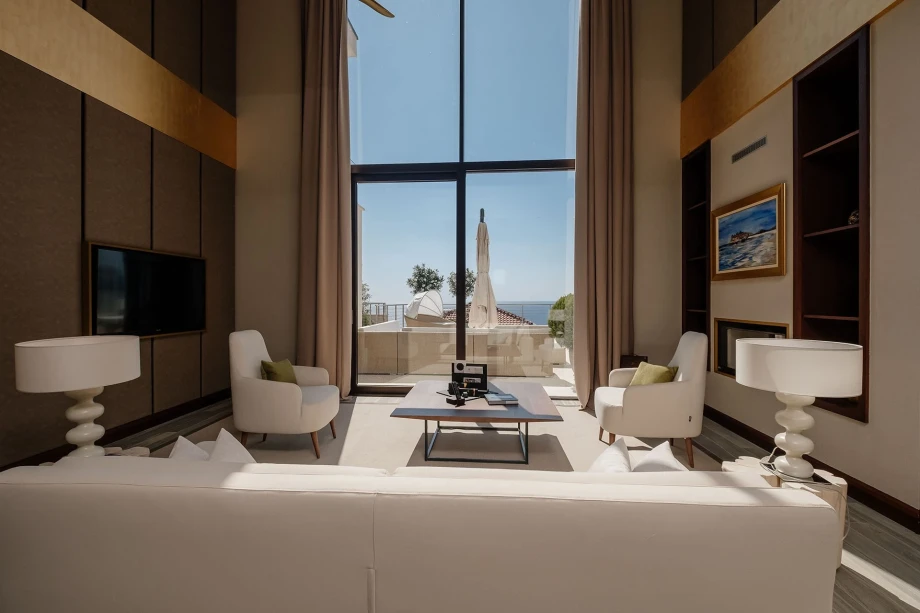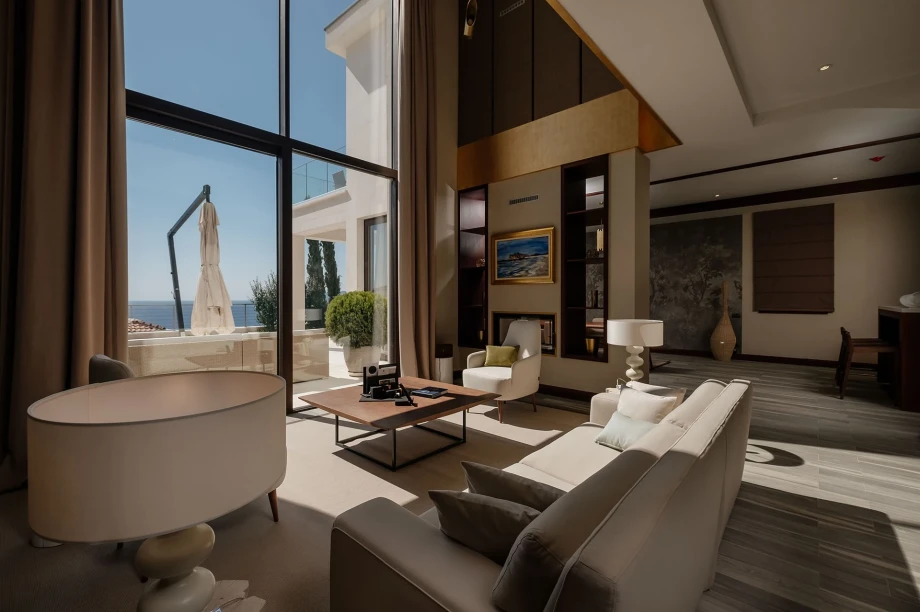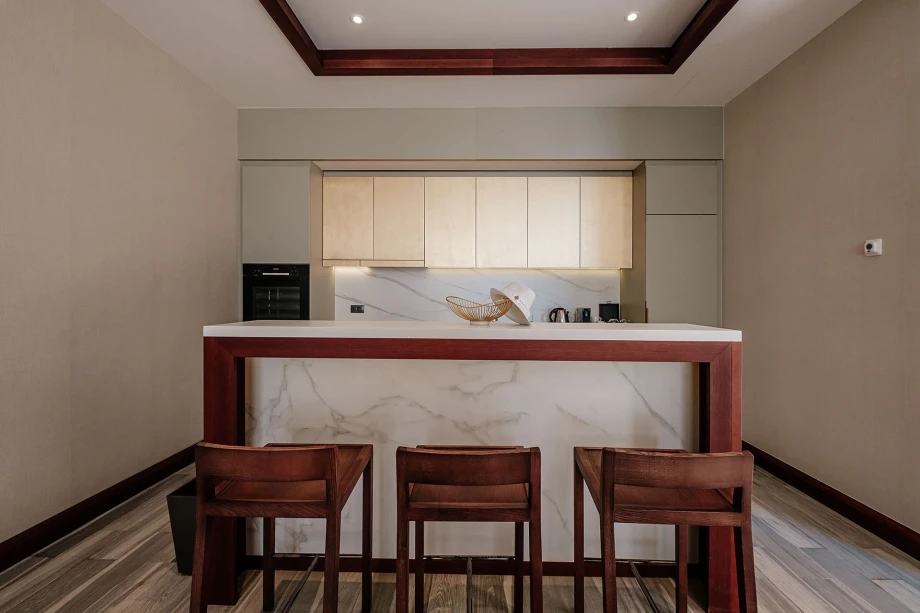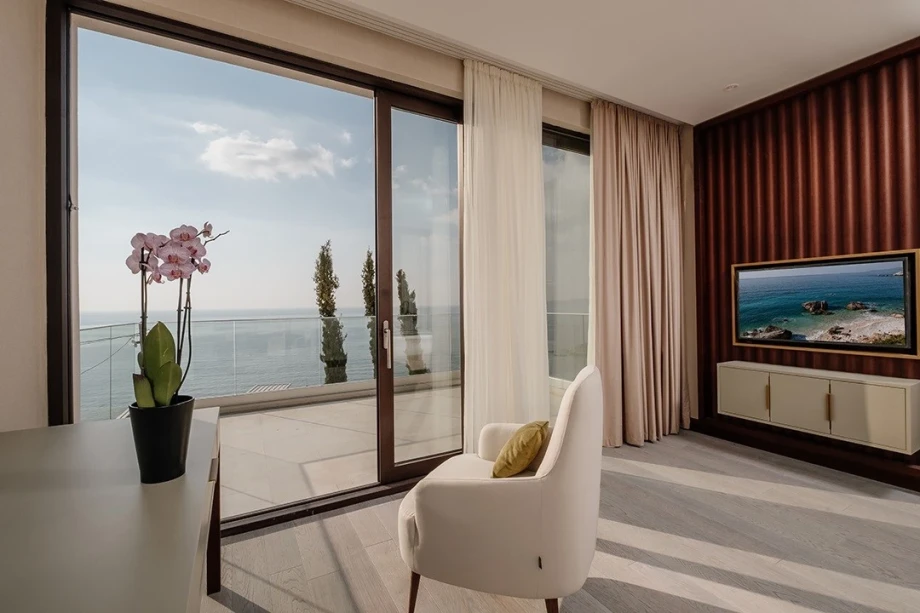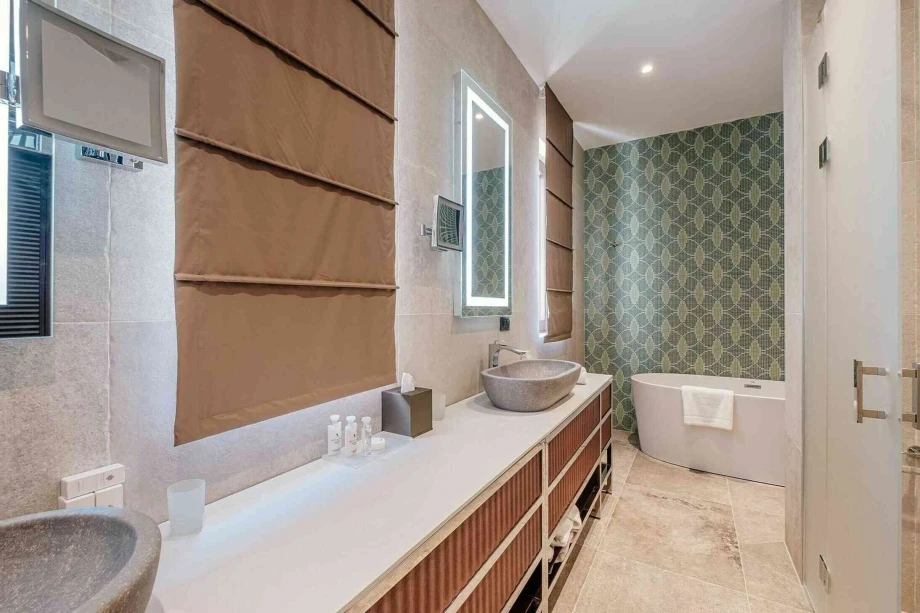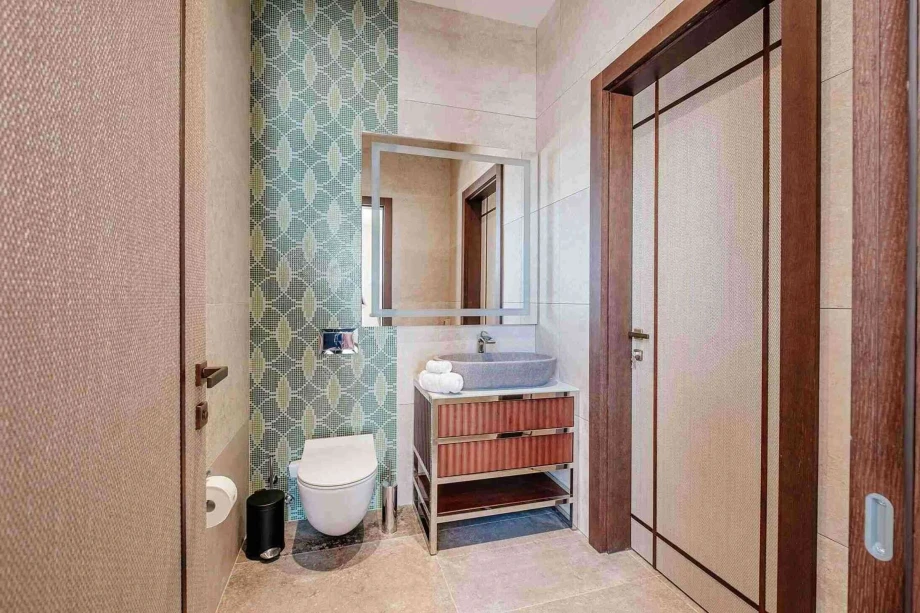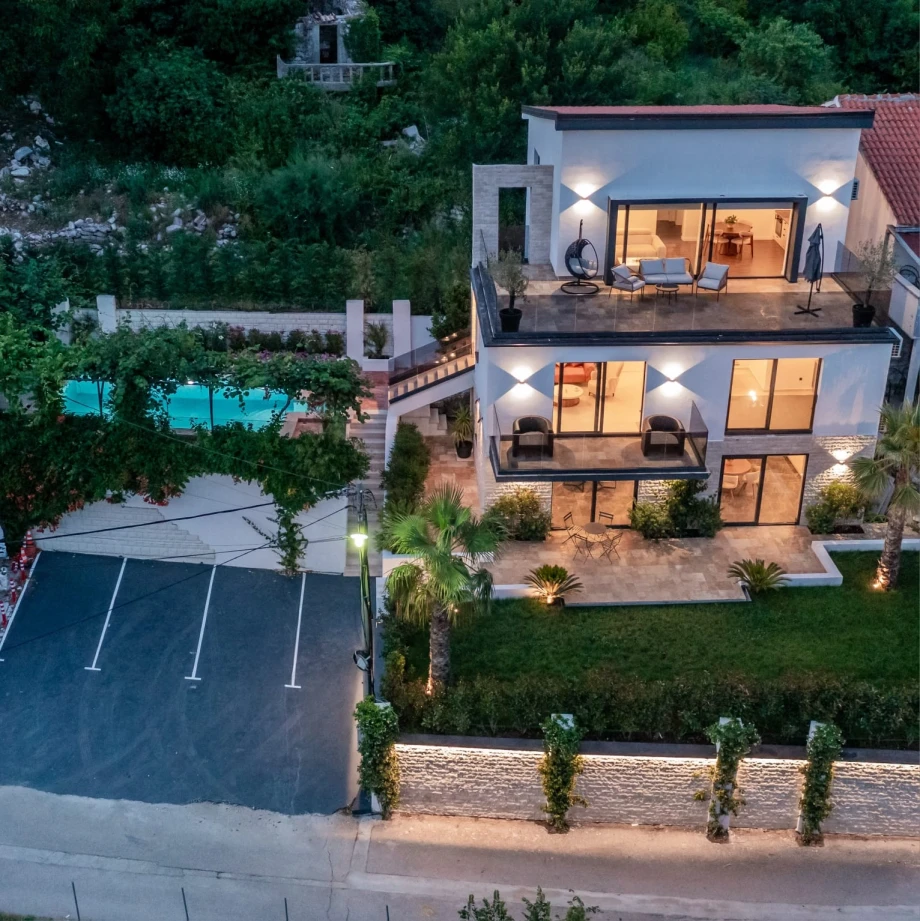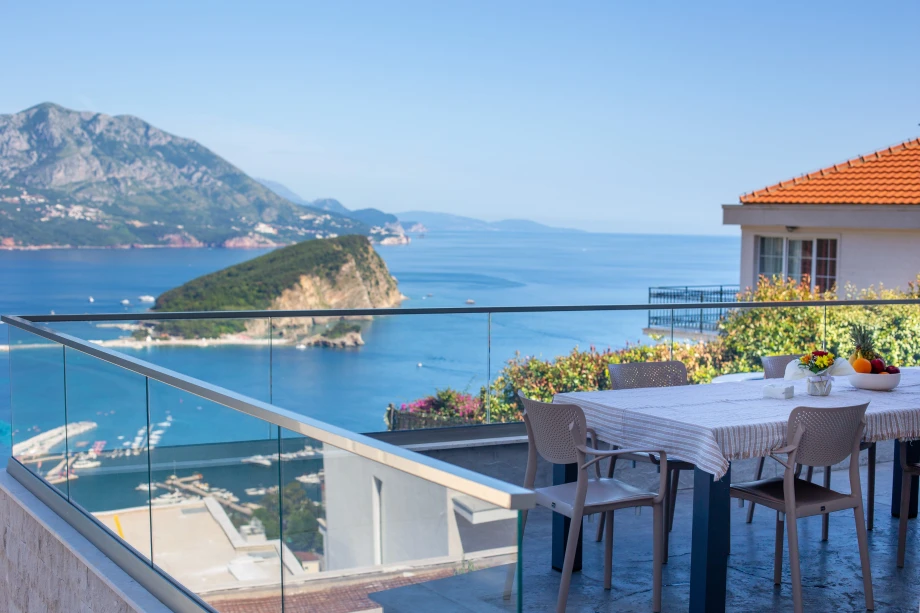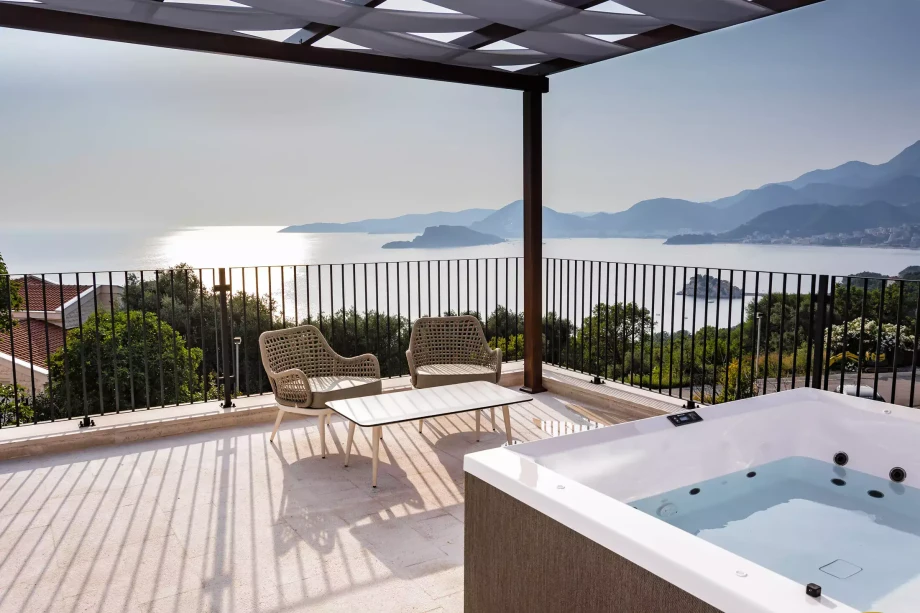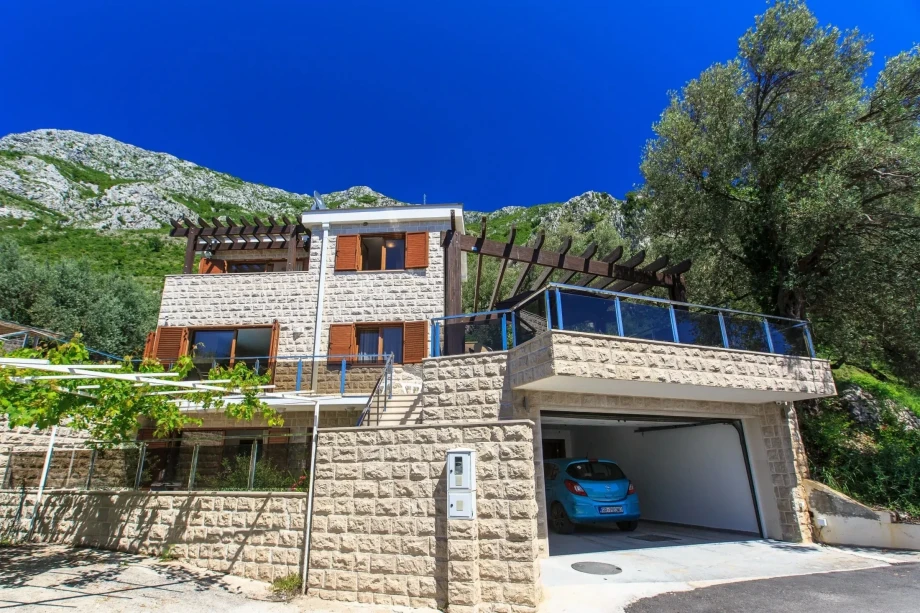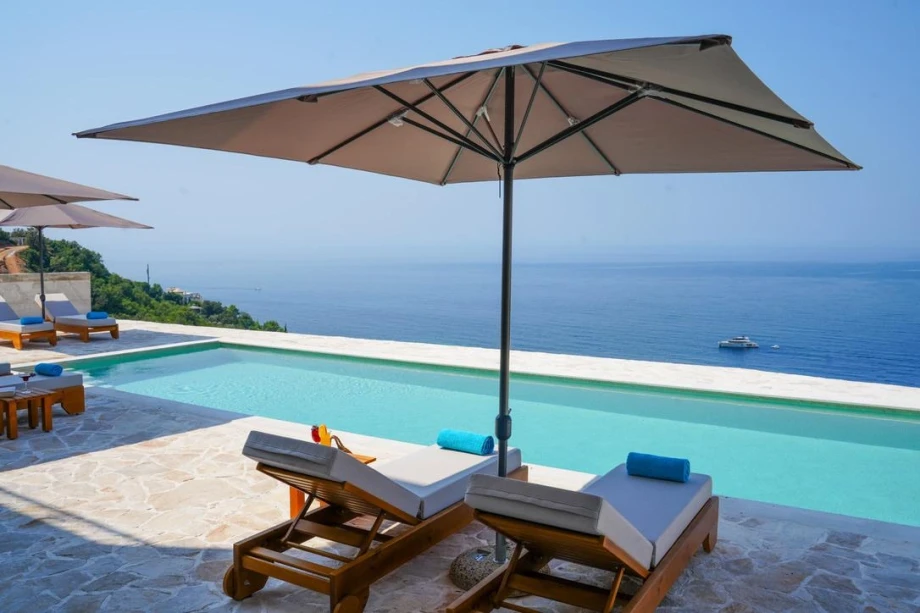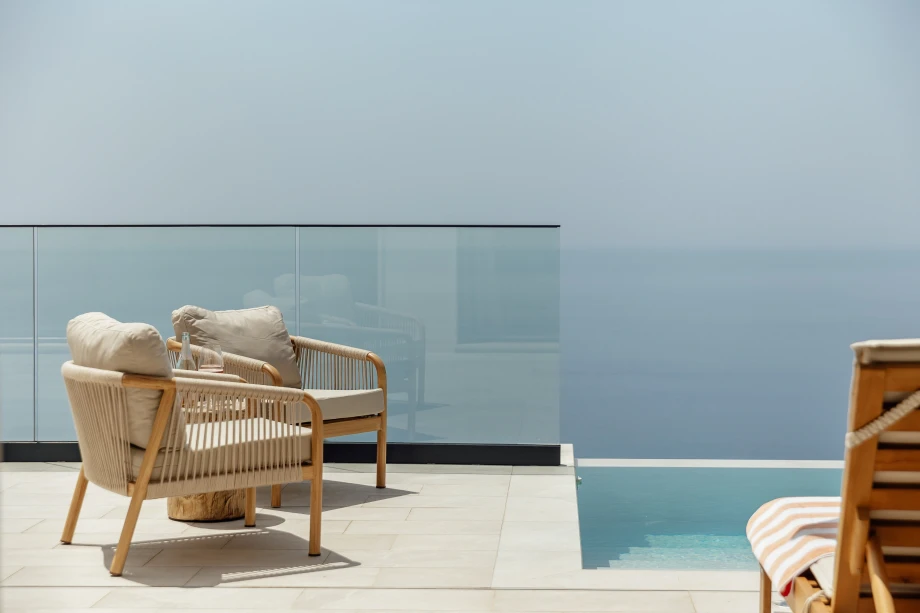
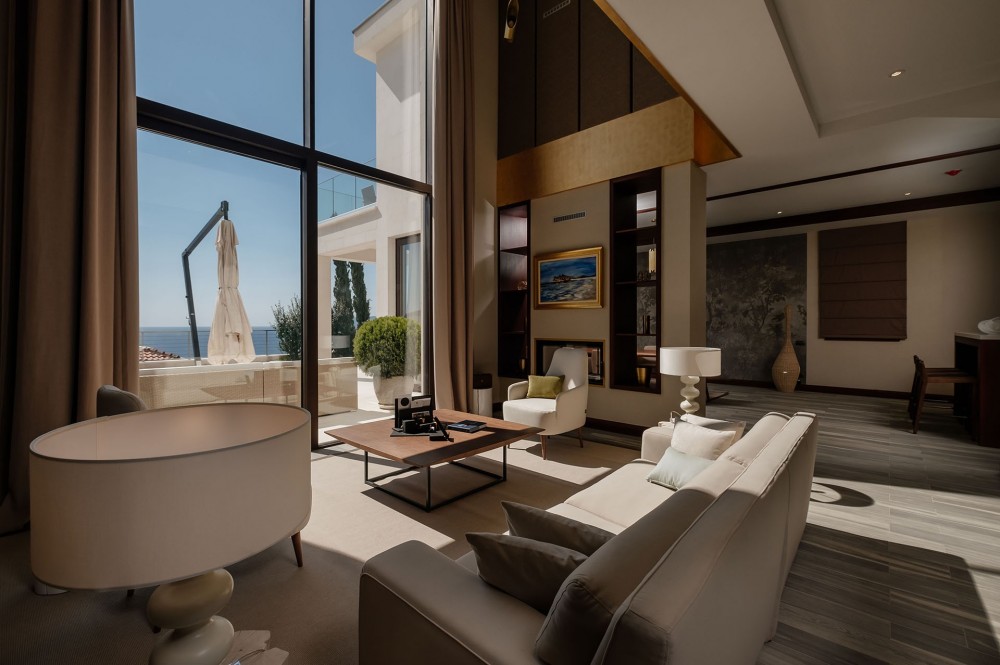
Budva
Ananti Signature Villa
Resort Units u Reževići (Budva Područje), Montenegro Coastline
Na istoj lokaciji
Pregled
Villa Ananti Signature postavlja novu definiciju luksuza i udobnosti. Ova vila sa bazenom deo je ekskluzivnog resorta, koji se nalazi na litici u selu Reževići sa pogledom na Jadransko more. Ovo je jedna od najpopularnijih destinacija za odmor na Budvanskoj rivijeri. S jedne strane mirno i mirno, as druge strane vrlo blizu svih zanimljivih lokacija koje možete posetiti tokom svog odmora u Budvi.
Sadržaji i usluge
Ovde ćete pronaći sveobuhvatan prikaz sadržaja i usluga nekretnine koju ste odabrali. Javite ako Vam je još nešto potrebno.
Kreveti i kupatila
Prvi sprat
Bedroom 3
Bedroom 2
Bedroom 1
Sadržaji
Opšte stavke
- Wi-Fi
- Opremljena kuhinja
- Smart TV
- Klima
- Klima u sobama
- Parking
- Garaža
Bazen&Wellness
- Privatni
- Outdoor
- Ležaljke
- Suncobrani
- Fen za kosu
Dnevni boravak & Trpezarija
- Smart TV
Bašta&terasa
- Vrt
- Terasa&patio
- Vanjska trpezarija
- Roštilj
- Laundž vani
Kuhinja
- Pribor za jelo i piće
- Mikrotalasna pećnica
- Kafemat
- Čajnik
Gejanje&hlađenje
- Podno grejanje
Održavanje prostora
- Pegla i daska za peglanje
- Peškiri
Pristup
- Lift
Lokacija i područje
Na mapi ispod pogledajte tačnu lokaciju vile, prilazne puteve kao i obližnje znamenitosti.
Udaljenost
Budva
Obimni arheološki dokazi svrstavaju Budvu među najstarija urbana naselja na jadranskoj obali. Značajni dokumentarni dokazi pružaju istorijske reference koje datiraju iz 5. veka pre nove ere.
Ilirski šlem iz Budve (4. vek p.n.e.)
Stari grad 1615.
Legenda priča da je Buto (Bouthoē - Bouthoe) osnovao Kadmo, osnivač Tebe, Grčka, kada je prognan iz Tebe, pronašavši utočište na ovom mestu za sebe i njegovu ženu, boginju Harmoniju.
Grčka kolonizacija Jadrana počela je u 4. veku pre nove ere, kada je na mestu Budve osnovano Emporijum. U 2. veku pre nove ere područje Budve ulazi u sastav Rimskog carstva. Padom Carstva i njegovom podelom na Istok i Zapad, odbrambena barijera koja je razdvajala dve sile prošla je preko ovog područja, ostavljajući trajni uticaj na istoriju i kulturu ovog grada.
U 6. veku Budva je bila deo Vizantijskog carstva, a u naredna dva veka na to područje počinju da pristižu Sloveni i, u manjoj meri, Avari, mešajući se sa starosedelačkim rimskim stanovništvom. Budvanski zaliv je navodno bio poznat kao Avarorum sinus (Avarski zaliv) tokom upada Avara. 841. godine, Budvu su opljačkali muslimanski Saraceni, koji su opustošili ovu oblast.
U ranom srednjem veku Budvom su vladali nizovi dokljanskih kraljeva, kao i srpskih i zetanskih aristokrata.
Venecijanske zidine Budue (Budva) na razglednici iz 1900
Oko 1200. postao je sedište rimokatoličke eparhije Budua, koja je trajala do 1828. godine i nominalno je oživela kao latinska titularna biskupija. Mlečani su vladali gradom skoro 400 godina, od 1420. do 1797. Budva, koja se u tim vekovima zvala Budua, bila je deo regiona Mletačke Republike Albanije Veneta i bila je utvrđena moćnim venecijanskim zidinama protiv osmanskih osvajanja. Prema istoričaru Luiđiju Paulučiju u svojoj knjizi „Le Bocche di Cattaro nel 1810“ (Bokokotorski zaliv 1810. godine), većina stanovništva govorila je venecijanskim jezikom sve do početka 19. veka. Jedan od najpoznatijih pozorišnih libretista i kompozitora, Kristoforo Ivanovič, rođen je u venecijanskom Buduu.
Padom Venecijanske Republike 1797. Budva je došla pod vlast Habzburške monarhije. Tokom Napoleonovih ratova, crnogorske snage savezničke sa Rusijom preuzele su kontrolu nad gradom 1806. godine, da bi grad prepustile Francuskoj 1807. Francuska je vlast trajala do 1813. godine, kada je Budva (zajedno sa Bokom Kotorskom) pripala Austrijskom carstvu, koja je je ostao pod kontrolom grada narednih 100 godina.
Unija Boke Kotorske (i Budve) sa Crnom Gorom trajala je kratko (1813–1814), ali je od 1814. do kraja Prvog svetskog rata 1918. Budva ostala pod Austrougarskom. U blizini je podignuta najjužnija tvrđava u Austrougarskoj, tvrđava Kosmač, koja je čuvala put od Budve do Cetinja. Nakon rata, srpska vojska je ušla u Budvu nakon što su je napustile austrijske snage i došla pod Kraljevinu Jugoslaviju.
1941. godine, sa početkom Drugog svetskog rata, Budva je pripojena Kraljevini Italiji. Budva je konačno oslobođena od vlasti Osovine 22. novembra 1944. godine i uključena u sastav Socijalističke Republike Crne Gore (koja je bila dio Socijalističke Federativne Republike Jugoslavije).
Katastrofalan zemljotres pogodio je Budvu 15. aprila 1979. godine. Veliki dio starog grada je devastiran, ali danas ima malo dokaza o katastrofi – skoro sve zgrade su vraćene u prvobitni oblik.
Crna Gora je postala nezavisna država 2006. godine, sa Budvom kao primarnom turističkom destinacijom.
Sveti Stefan Island
Sveti Stefan je kultno ostrvo koje se nalazi na jadranskoj obali Crne Gore. Ostrvo se nalazi na Budvanskoj rivijeri, delu crnogorske obale poznatom po svojim živopisnim plažama, čistom moru i istorijskim znamenitostima. Sveti Stefan je jedinstvena i idilična lokacija koja je tokom godina plijenila srca mnogih posjetilaca i nastavlja da bude destinacija koju moraju posjetiti svi koji posjećuju Crnu Goru.
Istorija Svetog Stefana
Istorija Svetog Stefana datira još od 15. veka kada se prvi put pominje u istorijskim zapisima. U to vreme, ostrvo je služilo kao ribarsko selo, ali je kasnije pretvoreno u utvrđeni grad da bi ga zaštitilo od gusarskih napada. Tokom 20. veka, Sveti Stefan je postao popularna turistička destinacija i posećivale su ga mnoge poznate ličnosti, uključujući filmske zvezde i političare. Šezdesetih godina prošlog veka ostrvo je pretvoreno u ekskluzivni hotel, koji je od tada postao jedan od najtraženijih hotela na svetu.
Geografija Svetog Stefana
Sveti Stefan je malo ostrvo koje se nalazi na obali Crne Gore. Sa kopnom je povezan uskom prevlakom, što ostrvu daje jedinstven oblik. Samo ostrvo je veličine samo 12.400 kvadratnih metara i dom je srednjovekovne tvrđave i šarmantnog ribarskog sela. Plaže ostrva poznate su po kristalno čistoj vodi i netaknutom belom pesku, što ga čini popularnom destinacijom za one koji traže sunce.
Kultura i turizam na Svetom Stefanu
Sveti Stefan je kulturno središte Crne Gore, jer se može pohvaliti bogatom istorijom i jedinstvenim šarmom koji privlači posjetioce iz cijelog svijeta. Srednjovekovna tvrđava ostrva je svedočanstvo o njegovoj prošlosti, a posetioci mogu da istraže njegove uske ulice, stare zgrade i istorijske znamenitosti. Ribarsko selo na ostrvu je fascinantno mesto za posetu, jer je dom mnogih tradicionalnih crnogorskih kuća, koje su izgrađene od kamena i imaju krovove od crvenih crepova.
Turizam je primarna industrija na ostrvu, a posetioci mogu uživati u širokom spektru aktivnosti, uključujući plivanje, sunčanje i sportove na vodi. Hoteli na ostrvu nude luksuzan smeštaj i izuzetnu uslugu, što ga čini idealnom destinacijom za one koji traže vrhunsko iskustvo odmora. Posetioci takođe mogu da obiđu čamce da istraže obližnje uvale i zalive, ili da posete obližnji grad Budvu, koji je poznat po živahnom noćnom životu i kulturnim atrakcijama.
Zaključak
Sveti Stefan je dragulj Crne Gore, destinacija koja spaja istoriju, kulturu i prirodne ljepote na jedinstven i zadivljujući način. Mala veličina ostrva negira njegov značaj, jer je igralo važnu ulogu u istoriji zemlje i nastavlja da bude popularna destinacija za posetioce iz celog sveta. Bilo da tražite miran bijeg ili odmor ispunjen avanturama, Sveti Stefan ima za svakoga ponešto, što ga čini destinacijom koju morate posjetiti za sve koji putuju u Crnu Goru.
Grad Teatar Budva
Grad teatar Budva teatar Grad Budva je godišnji festival koji slavi kulturu i umjetnost u gradu Budvi, Crna Gora. Festival ima dugu i bogatu istoriju, a osnovan je osamdesetih godina prošlog veka kao platforma za umetnike i izvođače da pokažu svoje talente i promovišu kulturnu baštinu Budve. Festival je danas jedan od najvažnijih kulturnih događaja u Crnoj Gori, koji privlači posjetioce iz cijelog svijeta i pruža platformu umjetnicima da prikažu svoj rad.
Istorijat Grad teatra Budva Teatar Grad Budva
Festival Grad teatar Budva teatar Grad Budva prvi put je održan 1987. godine i od tada je postao sastavni dio kulturnog pejzaža Crne Gore. Festival je osnovan sa ciljem promocije kulturnog nasljeđa Budve i pružanja platforme umjetnicima i izvođačima da pokažu svoje talente. Tokom godina, festival je postao sve popularniji i postao jedan od najvažnijih kulturnih događaja u zemlji.
Prekretnice i predstave
Festival ima širok spektar predstava, uključujući predstave, plesne predstave i muzičke koncerte. Festival se održava na različitim lokacijama širom Budve, uključujući pozorišta, parkove i javne trgove. Program festivala se mijenja svake godine, a posjetioce očekuje raznolik spektar predstava koje odražavaju kulturnu raznolikost Crne Gore.
Neke od najznačajnijih predstava u istoriji festivala su „Smrt Smail Age Čengića“ Dušana Kovačevića i „Ćelavi sopran“ Ežena Joneska. Ostali zapaženi nastupi su uključivali tradicionalne crnogorske igre, moderne plesne predstave i muzičke koncerte na kojima su nastupili domaći i međunarodni muzičari.
Uticaj na kulturu i turizam
Festival Grad teatar Budva Teatar Grad Budva imao je značajan uticaj na kulturu i turizam Crne Gore. Festival je postao važna platforma za umjetnike i izvođače da prikažu svoj rad i pomogao je u promociji kulturnog nasljeđa Budve. Festival je takođe privukao posetioce iz celog sveta, pomažući da se podstakne lokalna ekonomija i promoviše grad kao kulturna destinacija.
Pored kulturnog uticaja, festival je odigrao i važnu ulogu u promociji turizma u Budvi. Festival privlači posetioce iz celog sveta, od kojih mnogi ostaju u gradu nekoliko dana ili više. Ovo je pomoglo da se podstakne lokalna ekonomija i dovela do razvoja napredne turističke industrije u Budvi.
Zaključak
Festival Grad teatar Budva Teatar Grad Budva je proslava kulture i umjetnosti u Crnoj Gori. Duga i bogata istorija festivala, raznovrstan program nastupa i značajan uticaj na kulturu i turizam Budve čine ga jednim od najznačajnijih kulturnih događaja u zemlji. Za sve zainteresovane da dožive bogatu kulturnu baštinu Crne Gore, festival Grad teatar Budva Teatar Grad Budva ne treba propustiti.
Aerodrom Tivat
Aerodrom Tivat (IATA: TIV, ICAO: LYTV) je međunarodni aerodrom u Tivtu, primorskom gradu u Crnoj Gori koji opslužuje primorje Crne Gore i susedna područja.
Vebsajt aerodroma| Aerodrom odlaska | Avio-prevoznik | Pon | Uto | Mi | Čet | Pet | Sub | Ned |
|---|---|---|---|---|---|---|---|---|
| Istanbul, Turkey |

|
|||||||
| Paris, France |

|
|||||||
| Copenhagen, Denmark |

|
|||||||
| Oslo, Denmark |

|
|||||||
| Manchester, United Kingdom |

|
|||||||
| London, United Kingdom |

|
|||||||
| Bristol, United Kingdom |

|
|||||||
| Birmingham, United Kingdom |

|
|||||||
| Vienna, Austria |

|
|||||||
| Berlin, Germany |

|
|||||||
| Frankfurt, Germany |

|
|||||||
| Munich, Germany |

|
|||||||
| Düsseldorf, Germany |

|
|||||||
| Geneva, Switzerland |

|
|||||||
| Zurich, Switzerland |

|
|||||||
| Dubai, United Arab Emirates |

|
|||||||
| Tel Aviv, Israel |

|
|||||||
| Kuwait, Saudi Arabia |

|
|||||||
| Nikola Tesla, Serbia |

|
|||||||
| Baku, Azerbaijan |

|
|||||||
| Barcelona, Spain |

|
|||||||
| Riga, Latvia |

|
|||||||
| Helsinki, Finland |

|
Aerodrom Podgorica
Aerodrom Podgorica (poznat i kao aerodrom Golubovci; IATA: TGD, ICAO: LYPG) se nalazi u Golubovcima, 12km južno od glavnog grada Crne Gore, Podgorice.
Vebsajt aerodroma| Aerodrom odlaska | Avio-prevoznik | Pon | Uto | Mi | Čet | Pet | Sub | Ned |
|---|---|---|---|---|---|---|---|---|
| Athens, Greece |

|
|||||||
| Belgrade, Serbia |

|
|||||||
| Berlin, Germany |

|
|||||||
| Dortmund, Germany |

|
|||||||
| Brussels, Belgium |

|
|||||||
| Istanbul, Turkey |

|
|||||||
| Ankara, Turkey |

|
|||||||
| Izimir, Turkey |

|
|||||||
| Istanbul, Turkey |

|
|||||||
| Krakow, Poland |

|
|||||||
| Warsaw, Poland |

|
|||||||
| Gdansk, Poland |

|
|||||||
| Katowice, Poland |

|
|||||||
| London, United Kingdom |

|
|||||||
| London, United Kingdom |

|
|||||||
| Vienna, Austria |

|
|||||||
| Vienna, Austria |

|
|||||||
| Budapest, Hungary |

|
|||||||
| Milan, Italy |

|
|||||||
| Paris, France |

|
Aerodrom Dubrovnik
Međunarodni aerodrom u Dubrovniku (IATA: DBV, ICAO: LDDU) je jedan od većih međunarodnih aerodroma u Hrvatskoj. Aerdrom se nalazi u Ćilipima, na 13km južno od Starog grada Dubrovnika.
Vebsajt aerodroma| Aerodrom odlaska | Avio-prevoznik | Pon | Uto | Mi | Čet | Pet | Sub | Ned |
|---|---|---|---|---|---|---|---|---|
| Amsterdam, Netherlands |

|
|||||||
| Rotterdam, Netherlands |

|
|||||||
| Amsterdam, Netherlands |

|
|||||||
| Athens, Greece |

|
|||||||
| Athens, Greece |

|
|||||||
| Barcelona, Spain |

|
|||||||
| Madrid, Spain |

|
|||||||
| Berlin, Germany |

|
|||||||
| Düsseldorf, Germany |

|
|||||||
| Frankfurt, Germany |

|
|||||||
| Munich, Germany |

|
|||||||
| Hamburg, Germany |

|
|||||||
| Cologne, Germany |

|
|||||||
| Birmingham, United Kingdom |

|
|||||||
| Bristol, United Kingdom |

|
|||||||
| Edinburgh, United Kingdom |

|
|||||||
| London, United Kingdom |

|
|||||||
| Manchester, United Kingdom |

|
|||||||
| London, United Kingdom |

|
|||||||
| London, United Kingdom |

|
|||||||
| Bordeaux, France |

|
|||||||
| Paris, France |

|
|||||||
| Marseille, France |

|
|||||||
| Nantes, France |

|
|||||||
| Paris, France |

|
|||||||
| Paris, France |

|
|||||||
| Lyion, France |

|
|||||||
| Lyon, France |

|
|||||||
| Copenhagen, Denmark |

|
|||||||
| Dublin, Ireland |

|
|||||||
| Belfast, Ireland |

|
|||||||
| Dublin, Ireland |

|
|||||||
| Rome, Italy |

|
|||||||
| Naples, Italy |

|
|||||||
| Milan, Italy |

|
|||||||
| Helsinki, Finland |

|
|||||||
| Helsinki, Finland |

|
|||||||
| Helsinki, Finland |

|
|||||||
| Istanbul, Turkey |

|
|||||||
| Oslo, Norway |

|
|||||||
| Oslo, Norway |

|
|||||||
| Prague, Czech Republic |

|
|||||||
| Riga, Latvia |

|
|||||||
| Warsaw, Poland |

|
|||||||
| Warsaw, Poland |

|
|||||||
| Krakow, Poland |

|
|||||||
| Wroclaw, Poland |

|
|||||||
| Zürich, Switzerland |

|
|||||||
| Geneva, Switzerland |

|
|||||||
| Vienna, Austria |

|
|||||||
| Dubai, United Arab Emirates |

|
|||||||
| Split, Croatia |

|
|||||||
| Zagreb, Croatia |

|
|||||||
| Vienna, Australia |

|
|||||||
| Gothenburg, Sweden |

|
Aerodrom Tirana
Međunarodni aerodrom Majka Tereza (IATA: TIA, ICAO: LATI). To je najveći i jedini međunarodni aerodrom u Albaniji.
Vebsajt aerodroma| Aerodrom odlaska | Avio-prevoznik | Pon | Uto | Mi | Čet | Pet | Sub | Ned |
|---|---|---|---|---|---|---|---|---|
| Vienna, Austria |

|
|||||||
| Vienna, Austria |

|
|||||||
| London, United Kingdom |

|
|||||||
| London, United Kingdom |

|
|||||||
| Edinburgh, United Kingdom |

|
|||||||
| Barcelona, Spain |

|
|||||||
| Madrid, Spain |

|
|||||||
| Valencia, Spain |

|
|||||||
| Paris, France |

|
|||||||
| Lyon, France |

|
|||||||
| Nice, France |

|
|||||||
| Paris, France |

|
|||||||
| Paris, France |

|
|||||||
| Marseille, France |

|
|||||||
| Nantes, France |

|
|||||||
| Bordeaux, France |

|
|||||||
| Warsaw, Poland |

|
|||||||
| Wroclaw, Poland |

|
|||||||
| Krakow, Poland |

|
|||||||
| Gdansk, Poland |

|
|||||||
| Poznan, Poland |

|
|||||||
| Istanbul, Turkey |

|
|||||||
| Antalya, Turkey |

|
|||||||
| Antalya, Turkey |

|
|||||||
| Izmir, Turkey |

|
|||||||
| Berlin, Germany |

|
|||||||
| Frankfurt, Germany |

|
|||||||
| Munich, Germany |

|
|||||||
| Hamburg, Germany |

|
|||||||
| Leipzig, Germany |

|
|||||||
| Nuremberg, Germany |

|
|||||||
| Cologne, Germany |

|
|||||||
| Stuttgart, Germany |

|
|||||||
| Stuttgart, Germany |

|
|||||||
| Budapest, Hungary |

|
|||||||
| Budapest, Hungary |

|
|||||||
| Brussels, Belgium |

|
|||||||
| Milan, Italy |

|
|||||||
| Turin, Italy |

|
|||||||
| Verona, Italy |

|
|||||||
| Milan, Italy |

|
|||||||
| Trieste, Italy |

|
|||||||
| Genoa, Italy |

|
|||||||
| Pisa, Italy |

|
|||||||
| Perugia, Italy |

|
|||||||
| Rome, Italy |

|
|||||||
| Rome, Italy |

|
|||||||
| Naples, Italy |

|
|||||||
| Bari, Italy |

|
|||||||
| Bari, Italy |

|
|||||||
| Catania, Italy |

|
|||||||
| Comiso, Italy |

|
|||||||
| Stockholm, Sweden |

|
|||||||
| Zürich, Switzerland |

|
|||||||
| Geneva, Switzerland |

|
|||||||
| Basel, Switzerland |

|
|||||||
| Athens, Greece |

|
|||||||
| Athens, Greece |

|
|||||||
| Athens, Greece |

|
|||||||
| Lisbon, Portugal |

|
|||||||
| Riga, Latvia |

|
|||||||
| Abu Dhabi, United Arab Emirates |

|
|||||||
| Dubai, United Arab Emirates |

|
|||||||
| Prague, Czech Republic |

|
|||||||
| Warsaw, Aruba |

|
|||||||
| Heraklion, Aruba |

|
|||||||
| Bucharest, Romania |

|
|||||||
| Zagreb, Croatia |

|
|||||||
| Vilnius, Lithuania |

|
|||||||
| Oslo, Norway |

|
|||||||
| Copenhagen, Denmark |

|
|||||||
| Amsterdam, Netherlands |

|
|||||||
| Newcastle upon Tyne, England |

|
|||||||
| Cork, Ireland |

|
Šta je dobro da znate
Prvo dobre vesti (a ima ih dosta)
- Ovo je možda i najlepši dio obale u svako doba godine, gde možete da uživate u predjelima kakvi se obično viđaju samo u brošurama za odmor. Toplo plavo more, skrivene uvale, okomite planine koje se nadvijaju nad morem predstavljaju skoro jedinstven kontrast kakav se malo gdje može videti.
- Lokalno stanovništvo je divno. Bez obzira na jezičke barijere, očigledno je da daju sve od sebe da vam pruže pomoć i uslugu koja prevazilazi sve standarde.
- Nešto dalje od obale čeka vas pregršt stvari koje treba otkriti: bogata istorija Crne Gore (Crnogorci su poznati kao brojčano mali narod koji je u više navrata tokom bogate istorije pobeđivao mnogo brojnije neprijatelje), svetilišta (u Crnoj Gori se nezvanično nalazi najveći broj svetilišta na teško pristupačnim mjestima), čuda prirode, kao što je NP Skadarsko jezero. Ako se opredelite da Crnu Goru posjetite samo radi odmora na plaži, sigurno ćete se pokajati.
- Uprkos činjenici što se u zemlji ubrzano grade novi rizorti i hoteli, i dalje možete pronaći skrivene dragulje kao što su mala ribarska mjesta. Tako, primera radi, ako posetite Perast, možete uživati u ukusnoj morskoj hrani i pogledima na obližnja ostrva Gospa od Škrpjela i Sveti Marko.
- Ako se potrudite da pođete malo dalje od glavnih turističkih tačaka, možete otkriti skrivene plaže i mesta i uživati u makar delimičnoj izolaciji, bez gomile drugih turista. Na svim plažama postoji najmanje jedan restoran ili bar, po uzoru na grčke taverne, gdje možete da pijuckate koktele ili pivo u hladu guste borovine i da kunete tužnu sudbinu što morate da se vratite na posao!
- Ako ste ljubitelj morske hrane, onda ste došli na pravo mjesto. Možda nećete prepoznati naziv jela za koje se opredelite (izgleda da se Crnogorci teško odlučuju na jedan jedinstveni naziv jela čak i kada je riječ o dva restorana koji su jedan pored drugog), ali ćete sigurno dobiti fenomenalan izbor sveže ulovljene ribe, pa sami možete da odaberete koju ribu želite da vam spreme u restoranu. Plaćate ribu po težini i kategoriji, tako da u teoriji možete potrošiti dosta. Zapravo, možete da se gostite kao kralj, uz lokalno vino Vranac (crno vino) ili Krstac (bijelo vino) za manje od 10 eura po glavi.
- Što se tiče kvaliteta usluge, bićete prijatno iznenađeni. Ljubaznost je na nivou a od konobara možete da očekujete da vam preporuče specijalitete dana i da budete sigurni da vas niko neće nasamariti.
- Cijene su relativno pristupačne (iako će se i to promijeniti). Crna Gora je zemlja u kojoj vlada gotovina, ali se mogućnost plaćanja karticama vrlo brzo širi po svim restoranima, prodavnicama, benzinskim pumpama. Naravno, u urbanim cjelinama ćete pronaći i sve veći broj bankomata.
- Crna Gora je divna zemlja sa divnim ljudima.
Kalendar dostupnosti
Dodaci
Transfer from Podgorica Airport to the Villa includes a 7-seater luxury class passenger van.
Transfer from Tivat Airport to the Villa includes a 7-seater luxury class passenger van.
Transfer from Dubrovnik Airport to the Villa includes a 7-seater luxury class passenger van.
Small SUV for 5 persons (Audi Q3, BMW X1, Volkswagen Tiguan, Renault Kadjar...)
Smještajna politika
- Check in:: 15:00 h
- Check out:: 12:00 h
- Max. broj gostiju: 6
- Kućni ljubimci: Dozvoljeno
- Pušenje: Nije dozvoljeno
- Okupljanja: Nije dozvoljeno
Stroga
| Prije check in-a | povratno | Avans |
|---|---|---|
| 0 - 14 dani | 0% | 100% |
| 15 - 29 dani | 0% | 100% |
| 30 - 500 dani | 0% | 40% |
40 % non refundable deposit is required at the time of the booking. Full remaining payment is required 30 days prior to arrival. If cancelled 30 days or less prior to arrival, 100% of total stay charge will apply.
Damage Deposit €500
Rezervišite

Villa Expert
Azra Ševaljević
Za sve Vaše želje i savršen odmor!
Dopada vam se ovaj objekat?
Nastavite pretragu
Dodajte dodatke rezervaciji

Villa Expert
Azra Ševaljević
Za sve Vaše želje i savršen odmor!

